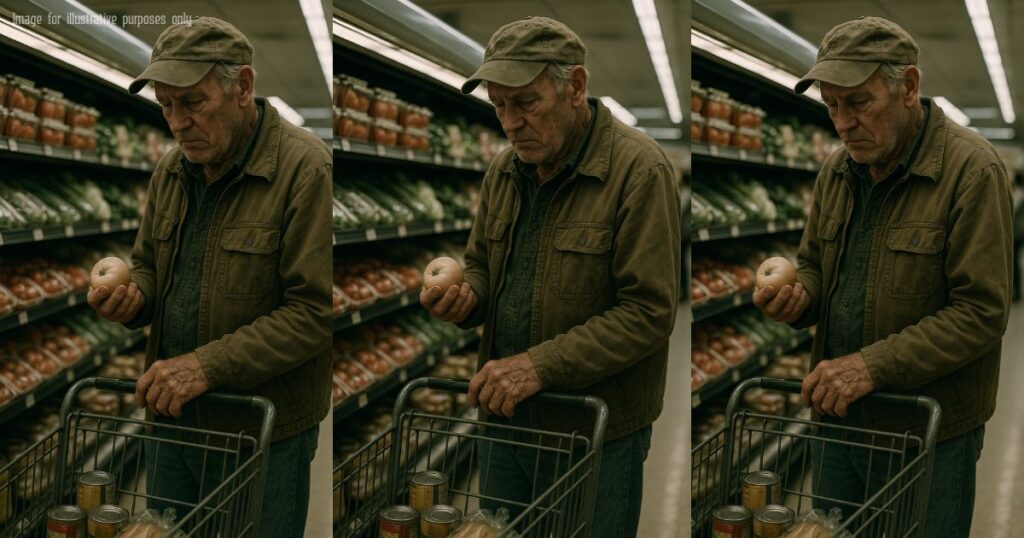I never thought one tomato could change a life.
But it did.
It started with a letter — folded neatly in a white envelope with a sunflower sticker on the back. No return address. Just “For Mr. Thomas McKinley” in pencil.
It came in October, when the beans had turned dry and rattled in their pods like maracas in the wind. The garden was quiet then. The kids had gone back to school. Emily stopped by less often, her hands full of textbooks now instead of trowels.
I opened it at the kitchen table. June was baking cornbread, the air thick with butter and old country music from the radio. I unfolded the paper and read, slowly — the way farmers read things that might carry more weight than they first appear.
Dear Mr. McKinley,
I don’t know if you remember me. My name is Emily. I helped in your garden when I was twelve. I’m twenty-three now. I live in Indiana. I’m writing because I just signed a lease on ten acres of land outside Bloomington. It’s not much, but it’s mine.
I wanted you to know that I wouldn’t have done it if not for you. That summer in your dirt changed something in me. You didn’t talk much, but you showed me everything I needed to learn. That soil — the smell of it, the life inside it — it stayed with me.
I’m going to grow heirloom tomatoes. The kind that taste like sunlight. The kind that made you cry when you held them up to the light like jewels.
Thank you for showing me what it means to feed people.
With love and dirt under my fingernails,
Emily
I cried. I won’t lie about that.
Put my head down right there on the kitchen table and let it come.
Not from sadness. Not from regret.
But from the raw, aching kind of joy that doesn’t fit in words.
June didn’t say anything. Just rested her hand on mine and squeezed.
After all these years — the losing, the selling, the hollowing out —
Here was proof that something had lived on.
Not the land. Not the barn. Not the farm as it used to be.
But something deeper. Something that couldn’t be bulldozed.
That fall, I hosted one last harvest day.
I knew my body was slowing down.
I didn’t need a doctor to tell me that.
So we made it special.
June baked pies.
The kids brought baskets.
The neighbors came — even the ones I hadn’t seen since the bank took the fields.
We laughed in the sunlight. Pulled carrots like treasure from the dirt.
A retired schoolteacher played bluegrass on a banjo while kids ran barefoot between rows of pumpkins.
No one mentioned condos. No one talked about markets.
It was just people and food and the earth under their feet.
I gave out seeds wrapped in old newspaper. Told everyone to plant something — even in a pot, even on a porch.
“Grow one thing,” I said.
“That’s how it starts.”
I spent the winter writing letters.
To the Department of Agriculture.
To the mayor.
To a man running for president.
Told them about Emily. About the acre. About the kids who’d never touched soil before that summer.
Told them that America wasn’t just steel and screens and shipping containers.
That there were still people out here — quiet people — who knew what food used to taste like.
Most didn’t write back.
But one did.
It was short. Typed. Probably written by a staffer.
But the last line hit me in the chest like a warm hand:
“American farmers are the backbone of this country. And under our administration, they will be respected, protected, and placed back at the heart of our nation’s future.”
I framed that letter and hung it in the shed — next to my father’s hoe and a photo of the old barn, still standing tall in black and white.
June and I don’t get around much anymore.
But every spring, when the frost lifts, we still put seeds in the ground.
Emily sends us photos — rows of tomatoes, sunflowers taller than her, a scarecrow with overalls she swears she found at a thrift shop just like mine.
She calls her land “Second Chances Farm.”
Says it’s not about profit. It’s about people.
Sometimes, I think about that first tomato — the one I picked when I was six, still warm from the sun, juice running down my arm.
My daddy had smiled and said, “That’s the taste of a job well done.”
And he was right.
Not all wealth comes in dollars.
Sometimes, it comes in seeds passed down.
In stories.
In soil under the nails.
I used to feed a town.
Now I feed memory.
And maybe, just maybe, that’s even more powerful.
Because what we plant — in earth and in hearts — doesn’t die when the fields are sold.
It grows in places we may never see.
In people we may never meet.
And that…
That is the harvest I’ll carry with me to the end.
🌱
Final Note:
American farmers are more than producers — they are the living roots of this nation. We can build cities, we can build machines, but without the hands that till the soil, we lose who we are. And if this country has any sense left in its bones, it’ll honor those hands again — before they’re gone forever.


